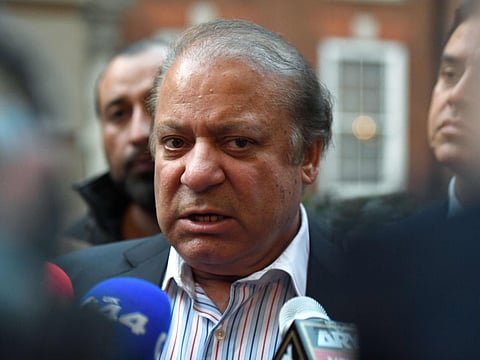Despair pitted against hope in Pakistan
While Nawaz Sharif battles for a political comeback, the country continues to surge ahead on the sidelines

Another week of drama is hardly news in Pakistan notably since former prime minister Nawaz Sharif was forced out of power in late July. Since then he has lost no opportunity to contest the action against him. The past week was therefore no different as Sharif made a defiant appearance at an anti-corruption court in Islamabad, only to be given a new date for his next appearance.
But the largely unnoticed news of senior Pakistani officials revealing that Pakistan annually dumps water worth a staggering $21 billion (Dh77.1 billion) in the Arabian Sea, raised profoundly challenging questions for successive governments. As some of Sharif’s coterie of politicians continue to question his dismissal, few can answer tough questions over his own government’s performance since 2013 when Sharif came to power. Matters such as the crisis surrounding Pakistan’s water storage capacity or the fate of its resource-starved government provided medical facilities and schools or indeed the rapidly burgeoning population, have hardly figured in discourse ranging from official circles to the parliament or provincial legislatures.
In the wake of Sharif’s departure however, some from his cronies even claimed that China’s decision to plan investments worth an unprecedented $56 billion in Pakistan was now in danger given the change of the prime minister. In the past week though, this fanciful claim yet again fell on its feet when a senior Chinese official told visiting Pakistani journalists in Beijing that the investment which is known as CPEC or China Pakistan Economic Corridor, will proceed irrespective of who is in power in Islamabad.
The moral of the story in the past week is indeed two fold. On the one hand, Pakistan’s high profile political drama remains at a disconnect from the country’s real life issues, while on the other hand, Sharif’s rule hardly saw his regime reform areas which mattered the most. Hence, the warning over the loss of a staggering volume of water every year comes as a very powerful reminder of the failure of successive regimes to focus on building badly needed dams. Consequently, Pakistan now has the capacity to store water which is enough for a month’s use in sharp contrast to the once officially proclaimed standard of taking this up to six months of storage at a very bare minimum.
Exactly what does Sharif have to show for his government’s four-year performance, before he was thrown out more than a year after going on trial in the supreme court, related to excessive amounts of wealth of his family outside Pakistan. The revelation which surfaced in the so-called Panama leaks case prompted the departure of the likes of the prime minister of Iceland. And yet, putting any Pakistani politician to shame remains a gigantic uphill battle.
Chronic shortages
The former prime minister’s departure followed his four-year rule where Pakistan lost out badly in areas that mattered the most. The country’s current account and trade deficits swelled while already meagre hopes for reforming one of the world’s worst performing tax collection systems hardly showed signs of improvement. For the broad public, already chronic electricity shortages continued unabated while promises of reforming Pakistan remained just that. In contrast, the Sharif regime remained obsessed with fanciful ideas such as running quick service air-conditioned buses on elevated platforms across urban areas and high speed highways for motorists. Tragically, such initiatives will neither serve to change illiterate Pakistanis or those afflicted with complicated health related ailments. As Pakistan’s ruling elite during Sharif’s tenure remained detached from the most vital challenges, the same could be said about members of parliament at the centre or the provinces. With such a disconnect between the ruling coterie and the ruled, the question of reforming Pakistan remains a compelling and difficult matter.
To be fair to Sharif, the gaps displayed by his regime equally apply to a succession of Pakistan’s regimes that have equally displayed a poor ability to reach out to reform areas which mattered the most. Ultimately, the most compelling question remains just one; where lies the hope to reform Pakistan?
The answer to that riddle must come from changes across Pakistan’s society where signs of ordinary citizens seeking to excel are multifold. Though Pakistan was engulfed in a rapidly mounting challenge posed by militant groups, that has begun to change in the past four to five years. And with militancy clearly on the back foot, there is a visible breathing space for the country to begin overcoming its challenges.
While the state is lagging on meeting the challenges, the emergence of privately run providers in areas like education or even health care provided by non-governmental organisations, offers a ray of hope. Similarly, world class talent in a range of areas from the arts and culture to science and business offers further encouragement. After all, Pakistan’s two Nobel laureates (Dr Abdus Salam, the physicist and Malala Yousufzai, the child campaigner for girls education) emerged to excel from a country confronted with much despair.
Such trends will continue to drive out some of Pakistan’s very best talents irrespective of the failures of successive governments to tackle tough challenges. Consequently, the past week may well serve to underline the difficult realities faced by a country where the likes of Sharif are battling for a political comeback. And yet, there’s a Pakistan which continues to surge ahead on the sidelines.
Farhan Bokhari is a Pakistan-based commentator who writes on political and economic matters.



